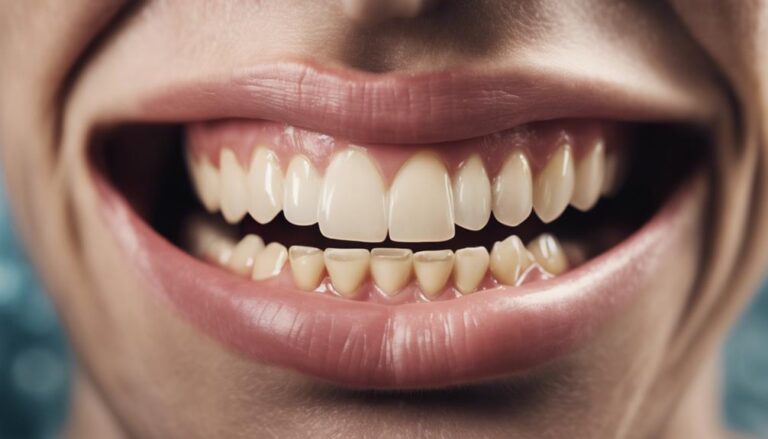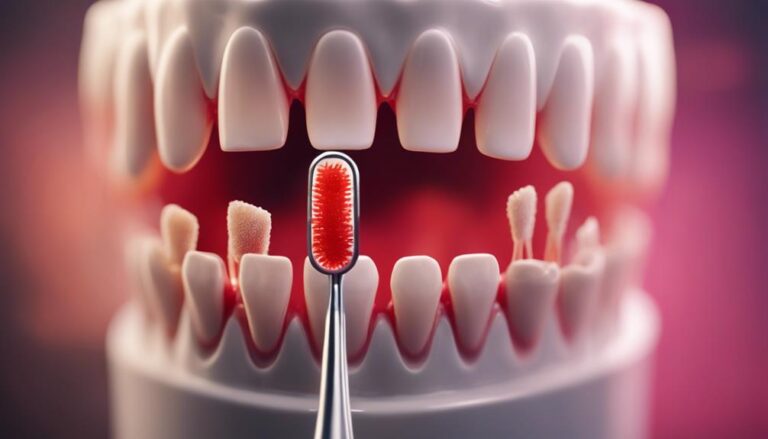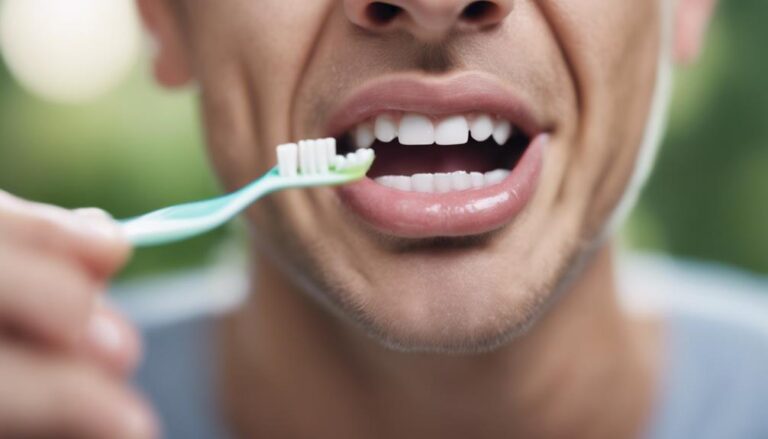Dental treatments for halitosis and gum disease work by targeting the root causes effectively. From professional interventions like scaling and root planing to lifestyle adjustments and preventive care, these treatments tackle the issues head-on. Understanding the causes of halitosis and gum disease is the first step to finding effective solutions. Professional dental cleanings, along with procedures like scaling and root planing, play a vital role in managing these conditions. Lifestyle changes, including proper oral hygiene and dietary habits, further support treatment effectiveness. Overall, a holistic approach is key to combating these oral issues successfully.
Key Takeaways
- Dental treatments target causes like plaque and bacteria to alleviate halitosis and gum disease.
- Professional cleanings remove plaque, preventing gum inflammation and decay, improving oral health.
- Antibacterial mouthwash and scaling help manage bacteria, reducing bad breath and gum disease progression.
- Periodontal surgery addresses deep gum pockets, promoting healing and preventing further oral health issues.
- Regular follow-up appointments ensure treatment effectiveness, prevent recurrence, and maintain long-term oral health benefits.
Causes of Halitosis
Halitosis, commonly known as bad breath, can be caused by various factors ranging from poor oral hygiene to underlying health conditions. When it comes to diet and halitosis triggers, certain foods like garlic and onions contain volatile compounds that can linger in the mouth and lead to unpleasant breath. Additionally, low-carb diets that induce ketosis may also result in a fruity-smelling breath due to the breakdown of chemicals called ketones.
Stress is another significant factor that can contribute to bad breath. When we’re stressed, our saliva production decreases, creating an environment in which odor-causing bacteria thrive. Furthermore, stress can lead to habits like mouth breathing or dry mouth, both of which can exacerbate halitosis. Understanding the relationship between stress and bad breath is important in managing halitosis effectively.
Understanding Gum Disease
Gum disease, also known as periodontal disease, is a common oral health condition that affects the tissues surrounding the teeth. It’s caused by the buildup of plaque, a sticky film of bacteria that forms on teeth. If not properly removed through regular brushing and flossing, plaque can harden into tartar, leading to gum inflammation. As gum disease progresses, it can result in gum recession, bone loss, and ultimately tooth loss if left untreated.
Understanding gum disease progression is important in preventing its severe consequences. Early stages of gum disease, known as gingivitis, are reversible with proper oral hygiene and professional dental care. However, if left untreated, gingivitis can progress to periodontitis, a more advanced stage of gum disease that requires more intensive treatment.
Oral health education plays a significant role in preventing gum disease. Proper brushing and flossing techniques, regular dental check-ups, and a balanced diet can help maintain healthy gums and prevent the progression of gum disease. By staying informed and proactive about oral health, individuals can protect their smiles for years to come.
Importance of Oral Hygiene
Maintaining excellent oral hygiene is paramount to preventing the progression of gum disease and ensuring overall oral health. Effective brushing techniques, such as using a soft-bristled brush and gentle circular motions, are essential for removing plaque and bacteria that can lead to gum disease. It’s recommended to brush at least twice a day for two minutes each time. Flossing habits complement brushing by cleaning areas between teeth where a toothbrush can’t reach, reducing the risk of gum inflammation and cavities.
In addition to brushing and flossing, a balanced diet rich in vitamins and minerals plays a significant role in oral health. Foods high in sugar and carbohydrates can contribute to plaque buildup and tooth decay, while foods high in calcium and vitamin C can strengthen teeth and gums. Staying hydrated is also important as saliva helps wash away food particles and bacteria, maintaining a healthy oral environment. By incorporating proper brushing techniques, consistent flossing habits, a healthy diet, and adequate hydration, one can promote excellent oral hygiene and prevent the development of gum disease.
Professional Dental Cleanings
Regular professional dental cleanings are essential for maintaining excellent oral health and preventing the progression of gum disease. These cleanings are typically recommended every six months to remove plaque and tartar buildup that regular brushing and flossing may miss. Alongside the cleaning, your dentist can provide valuable tips on flossing techniques and may recommend dental sealants to protect your teeth from decay.
| Benefits of Professional Dental Cleanings | ||
|---|---|---|
| 1. Prevent gum disease progression | 2. Remove plaque and tartar buildup | 3. Identify early signs of dental issues |
| 4. Improve overall oral health | 5. Receive personalized oral care advice |
Furthermore, during these cleanings, your dentist can address concerns such as tooth sensitivity and provide guidance on teeth whitening options if desired. By investing in regular professional cleanings, you are taking proactive steps towards a healthier smile and overall well-being.
Scaling and Root Planing
During professional dental cleanings, dentists may recommend scaling and root planing to address deeper issues related to gum health and prevent further deterioration. Scaling involves removing plaque and tartar from the tooth surfaces both above and below the gumline. This process helps in reducing inflammation and the depth of periodontal pockets, promoting healthier gums and preventing gum disease progression. Root planing, on the other hand, smoothens the root surfaces to remove bacterial toxins and promote gum reattachment.
Scaling and root planing are commonly recommended for patients with gum disease, as they can help prevent the need for more invasive treatments like root canals. By addressing gum issues early on, the need for extensive procedures can often be avoided. Additionally, after scaling and root planing, patients may notice an improvement in the appearance of their teeth, which can be further enhanced with teeth whitening procedures.
Antibacterial Mouthwash
When addressing gum disease and halitosis, incorporating an antibacterial mouthwash into your daily oral hygiene routine can help effectively reduce harmful bacteria in the mouth. Good oral health is essential for overall well-being, and using an antibacterial mouthwash is a simple yet powerful way to enhance your oral hygiene regimen. These mouthwashes are specifically formulated to target and control bacteria that can lead to gum disease and bad breath.
Regular use of antibacterial mouthwash can assist in maintaining a healthy balance of oral bacteria, promoting healthier gums and fresher breath. By reducing the levels of harmful bacteria in the mouth, these mouthwashes contribute to better bacteria control and overall oral health. When used in conjunction with brushing, flossing, and regular dental check-ups, antibacterial mouthwash can be a valuable tool in your arsenal against gum disease and halitosis. Remember, consistent oral hygiene practices are key to achieving optimal oral health.
Laser Therapy for Gum Disease
Laser therapy presents an advanced treatment option for addressing gum disease, offering precise and targeted care to combat periodontal issues effectively. The benefits of laser therapy for gum disease include reduced bleeding, swelling, and discomfort during and after the procedure. The laser can selectively target and remove infected tissue while leaving healthy tissue unharmed, promoting faster healing. This precision results in less trauma to the gums compared to traditional surgery, leading to a quicker recovery time for patients.
Studies have shown the effectiveness of laser therapy in reducing bacteria and promoting gum tissue regeneration. The healing process after laser therapy is typically faster than with conventional surgery, with many patients experiencing minimal post-operative pain and swelling. Additionally, laser therapy can stimulate the growth of new collagen fibers, aiding in the attachment of the gums to the teeth. Overall, laser therapy offers a promising alternative for treating gum disease, with its benefits including effectiveness, precision, and a faster recovery time.
Wisdom Tooth Extraction
For patients experiencing discomfort or complications due to wisdom teeth, extraction may be recommended by a dental professional to alleviate symptoms and prevent further issues.
When undergoing wisdom tooth extraction, it’s crucial to take into account various aspects to guarantee a smooth process and recovery. Here are some key points to bear in mind:
- Recovery Tips and Dietary Restrictions
- Follow post-operative care instructions provided by your dentist.
- Stick to a soft-food diet to aid healing and prevent irritation.
- Avoid using straws and smoking, as these actions can disrupt the healing process.
- Pain Management and Anesthesia Options
- Discuss anesthesia options with your dentist to determine the most suitable choice for your extraction.
- Take prescribed pain medication as directed to manage discomfort effectively.
- Apply ice packs to reduce swelling and alleviate pain in the initial days following the extraction.
Halitosis Treatment Options
Upon completing wisdom tooth extraction, exploring halitosis treatment options becomes important for individuals seeking thorough oral care. Bad breath, or halitosis, can be a distressing issue that affects many individuals.
One effective approach to combatting bad breath is through dietary modifications. Avoiding foods with strong odors such as garlic and onions can help reduce oral odor. Additionally, staying hydrated by drinking an adequate amount of water can also help prevent dry mouth, which is a common cause of bad breath.
Natural remedies can also be beneficial in addressing oral odor. Rinsing with a mixture of warm water and salt can help kill bacteria in the mouth that may contribute to bad breath. Chewing on fresh herbs like parsley or mint leaves can provide a temporary solution to mask unpleasant odors. These natural remedies can be a convenient and cost-effective way to manage halitosis between dental visits.
Benefits of Fluoride Treatments
Fluoride treatments offer significant benefits in strengthening tooth enamel and preventing cavities by remineralizing weakened areas. The efficacy of fluoride in dental care is well-documented, providing tangible results in oral health maintenance.
Here are key benefits of fluoride treatments:
- Prevention of Tooth Decay: Fluoride helps to prevent tooth decay by making the enamel more resistant to acid attacks from plaque bacteria and sugars in the mouth.
- Remineralization: Fluoride aids in the remineralization process, where minerals like calcium and phosphate are deposited back into the enamel, reversing early signs of tooth decay.
- Enhanced Treatment Results: When used in conjunction with good oral hygiene practices, fluoride treatments can enhance the overall effectiveness of dental treatments, ensuring a healthier mouth.
Gum Disease Surgery
Gum disease surgery, also known as periodontal surgery, is a common treatment option for advanced stages of gum disease that can’t be effectively managed through non-invasive methods. This surgical intervention aims to address severe gum disease by removing tartar deposits, reducing pocket depths around teeth, and repairing damaged bone tissue. While prevention is key to avoiding gum disease, surgery becomes necessary when the condition progresses to a severe stage. Long-term effects of untreated gum disease can include tooth loss, bone damage, and systemic health issues.
Halitosis, or bad breath, can be a symptom of advanced gum disease. When gum disease advances, bacteria proliferate, leading to foul-smelling breath. Surgery can help eliminate deep pockets where bacteria thrive, improving halitosis in the process. In cases where halitosis is caused by gum disease, surgical intervention can be an important step in addressing the underlying causes. By combining gum disease prevention strategies with appropriate treatment options like surgery, individuals can maintain good oral health and prevent long-term complications.
Lifestyle Changes for Fresh Breath
To maintain fresh breath, implementing specific lifestyle changes can be highly effective in reducing halitosis and promoting overall oral health. Making adjustments in diet, stress management, and hydration can have a substantial impact on the freshness of your breath and improve your oral health.
- Diet modifications: Consuming a balanced diet rich in fruits, vegetables, and whole grains can help prevent bad breath by reducing the growth of odor-causing bacteria in the mouth.
- Oral health: Maintaining good oral hygiene practices such as regular brushing, flossing, and using mouthwash can prevent the buildup of plaque and bacteria that lead to halitosis.
- Stress management: Stress can contribute to dry mouth and other oral health issues that can result in bad breath. Implementing stress-reducing techniques like meditation or yoga can help improve oral health and keep your breath fresh.
- Hydration: Drinking an adequate amount of water throughout the day helps keep your mouth moist and aids in washing away food particles and bacteria that can cause bad breath.
Dental Implants for Gum Disease
Utilizing advanced dental implant technology has shown promising results in effectively addressing gum disease and restoring oral health. Dental implants for gum disease have high success rates, making them a reliable treatment option. Studies indicate that dental implants have success rates ranging from 90% to 95% over a ten-year period, showcasing their long-term benefits in managing gum disease.
One of the key advantages of dental implants for gum disease is their ability to provide a permanent solution. Unlike other treatments that may require frequent maintenance or replacement, dental implants offer a durable and long-lasting option for patients. By integrating with the jawbone, implants provide stability and support for artificial teeth, restoring both function and aesthetics to the mouth.
Moreover, dental implants can help prevent further bone loss that often occurs with advanced gum disease. By stimulating the jawbone through chewing and biting, implants promote bone growth and maintain the overall structure of the jaw. This not only supports the surrounding teeth but also contributes to the overall health of the oral cavity.
Halitosis and Gum Disease Prevention
Addressing halitosis and preventing gum disease involves maintaining good oral hygiene practices and being mindful of factors that can contribute to these conditions. Consistent care of your teeth and gums is essential in preventing these issues.
Here are some key points to think about:
- Dietary habits: A diet high in sugary foods and drinks can contribute to gum disease by fueling harmful bacteria in the mouth. Opt for a balanced diet rich in fruits, vegetables, and lean proteins to support overall oral health.
- Natural remedies: Some natural remedies like oil pulling with coconut oil or using tea tree oil mouthwash may help in reducing bacteria in the mouth that can cause bad breath and gum disease. However, it’s important to consult with a dental professional before trying these remedies to guarantee they’re safe and effective.
- Regular dental check-ups: Visiting your dentist for regular cleanings and check-ups is important in preventing gum disease and catching any issues early on. Professional cleanings can remove plaque and tartar buildup that regular brushing and flossing may miss.
Follow-up Care and Maintenance
For effective management of halitosis and gum disease, consistent follow-up care and maintenance are essential components in ensuring long-term oral health. Follow-up appointments play a vital role in monitoring the progress of treatments, addressing any new concerns, and preventing relapses. During these appointments, your dentist will evaluate your oral health, provide professional cleanings, and recommend any necessary adjustments to your oral care routine. It’s important to attend these follow-up appointments regularly to maintain the benefits of your initial treatment and prevent the recurrence of halitosis and gum disease.
In addition to follow-up appointments, long-term maintenance relies on developing healthy oral care habits. This includes brushing your teeth at least twice a day, flossing daily, using antimicrobial mouthwash, and adopting a balanced diet low in sugars. Consistency in these habits is key to preventing plaque buildup, reducing the risk of gum disease, and maintaining fresh breath. By prioritizing follow-up care and embracing healthy oral care practices, you can sustain the results of your dental treatments and enjoy excellent oral health in the long run.
Frequently Asked Questions
Can Genetics Play a Role in Developing Halitosis or Gum Disease?
Genetic predisposition can influence halitosis and gum disease development, but proper hygiene remains essential. Lifestyle choices like smoking can exacerbate these conditions. Prevention through regular dental visits and good oral care habits is key.
Are There Any Natural Remedies That Can Help With Bad Breath?
When it comes to addressing bad breath, herbal remedies like mint and tea tree oil, along with certain mouthwashes, can be beneficial. Additionally, making dietary adjustments and incorporating probiotics can help improve overall oral hygiene and combat halitosis.
How Long Do the Effects of Professional Dental Cleanings Last?
When I prioritize oral hygiene and get regular dental check-ups, the effects of professional dental cleanings typically last about 3-6 months. Consistent care helps maintain oral health and prevent gum disease.
Can Stress or Anxiety Contribute to Halitosis or Gum Disease?
Stress impact on oral health can worsen conditions like halitosis and gum disease. Anxiety connection may lead to poor oral hygiene habits. Managing stress and anxiety through relaxation techniques can help improve overall oral health.
Are There Any Specific Foods That Can Worsen Bad Breath or Gum Health?
Maintaining ideal hydration levels and limiting sugar intake can help improve bad breath and gum health. Additionally, prioritizing oral hygiene practices and avoiding smoking contribute greatly to fresher breath and better gum condition.
Conclusion
To sum up, dental treatments for halitosis and gum disease work because they target the root causes of these conditions, such as bacteria buildup and poor oral hygiene. By addressing these issues through professional cleanings, scaling and root planing, and lifestyle changes, patients can experience fresher breath and healthier gums.
For example, I recently had a patient who suffered from chronic bad breath due to gum disease, but after undergoing treatment, their confidence and overall oral health improved greatly.






